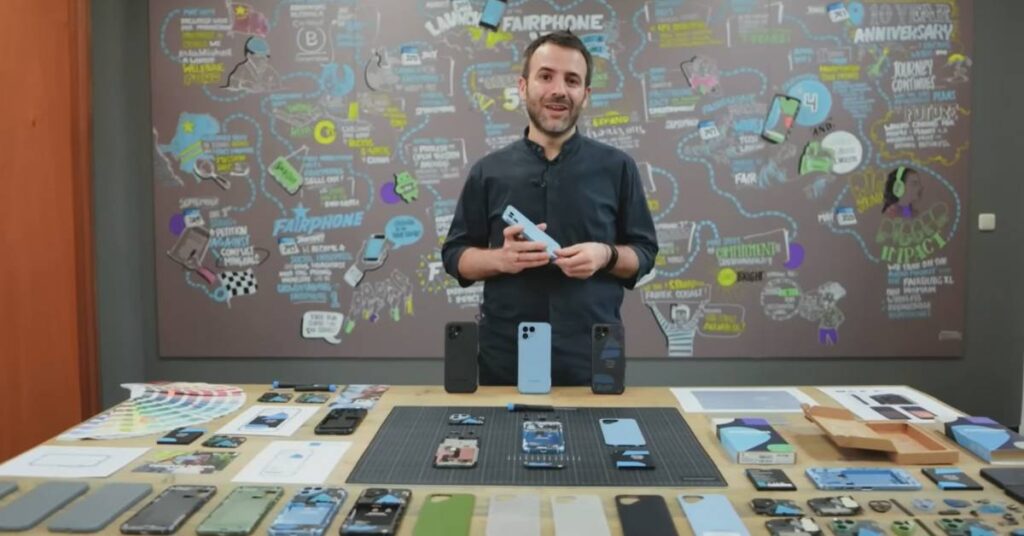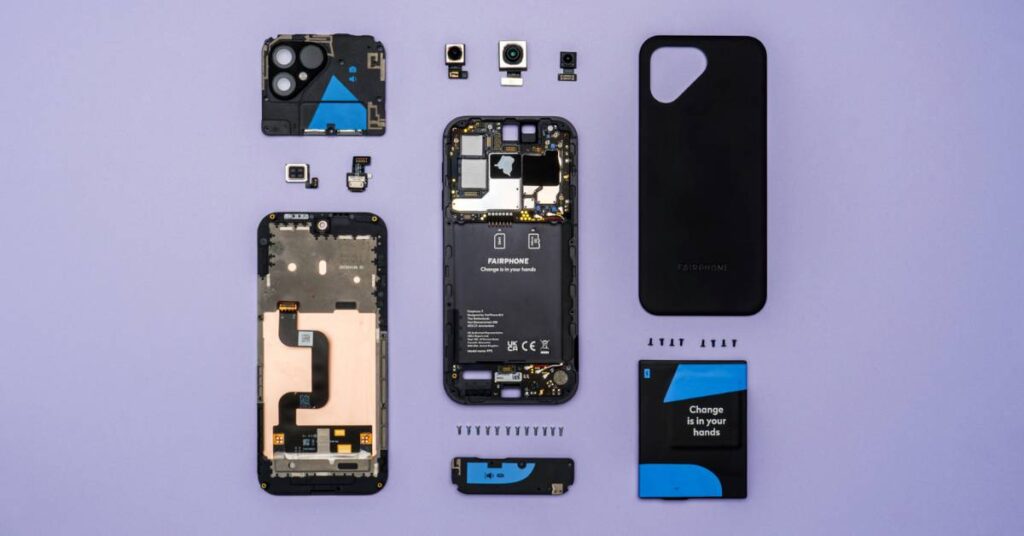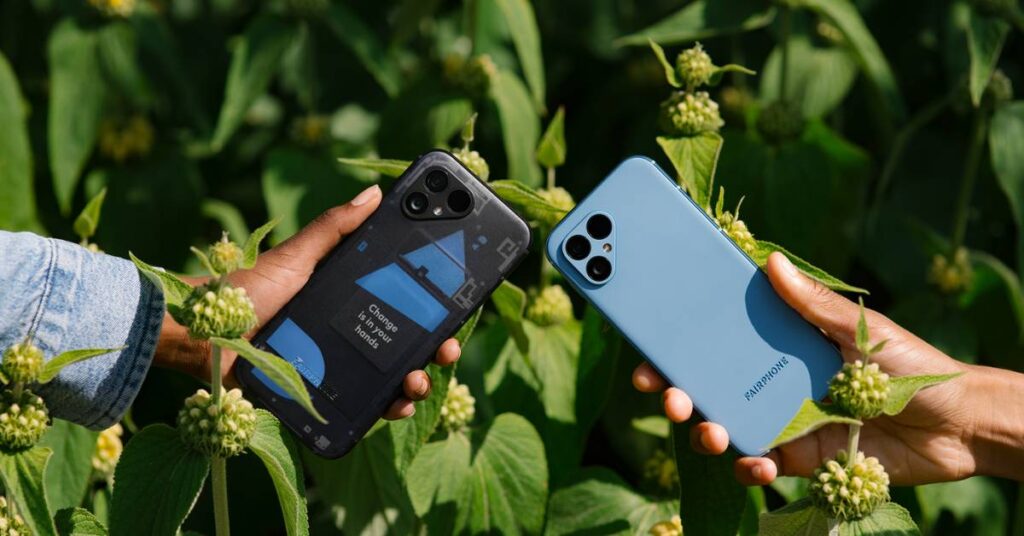“The Best Smartphone on Earth – (Not Clickbait)” That’s how tech YouTuber Zack Nelson described the new Fairphone 5 on his channel.
Known for his channel JerryRigEverything, where he takes apart smartphones and tests their durability, the Fairphone 5 was called the best for being built differently from most other smartphones available in the market.
Smartphones are normally glued shut, which makes them difficult to repair and consumers are left with no option but to upgrade when a newer model hits the market.
With Fairphone, the Amsterdam-based electronics manufacturer has taken a different approach, one that focuses on sustainability, longevity, and future proofing with a long update cycle.
Launched late last month, the Fairphone 5 with its modular design takes that goal a step further, making it not only easier to repair but also comes with user replaceable parts.
A social enterprise

Fairphone was founded as an awareness campaign about conflict minerals in 2010 and began making its own smartphones only in 2013.
In the past 10 years, Miquel Ballester, co-founder and Head of Product Management at Fairphone, says the hardware startup has sold over 550,000 phones.
That number may look small considering 268 million smartphones were shipped during the second quarter of 2023 alone according to Counterpoint Research, but the impact has been bigger.
A smartphone comprises over 50 different materials and each has its own complex supply chain, making it difficult to build them.
That complex supply chain is further complicated by the use of conflict minerals and with Fairphone 1 in 2013, the Dutch startup wanted to show that it is possible to build a phone through actually sourcing those minerals in conflict areas in a responsible way.
“Our influence increased significantly once we began designing smartphones from scratch and having our own supplier relationships with the Fairphone 2 in 2015,” says Ballester.
Since then, Fairphone has improved working conditions at mining sites, expanded its focus from eight to 14 focus materials, and its Fair Materials Sourcing Roadmap charts its path towards making fair and ethical electronics.
“Our mission was always to set an example,” says Ballester, adding that Fairphone is an example that a fair business model is possible.
From its conflict-free tin initiative to the Fair Cobalt Alliance, which Tesla joined in 2020, Ballester says the industry is listening to the impact of their social enterprise.
Sustainability can sell

Smartphones have become indispensable in our lives but the worrying fact is that most smartphone makers don’t build their devices with focus on longevity.
There is a new iPhone every year because consumers are willing to upgrade and the spec war in the Android world means even incremental gains get pitched as a reason enough to upgrade.
With its products, Fairphone wants to shun that very idea. Fairphone 5 uses 70 per cent fair or recycled focus materials, making it the most sustainable phone yet from the company.
It also comes with five years of warranty, user replaceable parts, and promised software support till 2031.
However, being a fair and most sustainable phone is not the only selling point. Ballester says it is also their best phone from a technical standpoint.
Sure, any other smartphone priced at €699 will offer far superior hardware but it will still dwarf Fairphone 5 when it comes to software support and ease of repair.
That, Ballester believes is a major selling point and what makes Fairphone profitable for three years in a row.
“When we started out, many people believed there would be no demand for a phone that cares about people and the planet,” he says. “Ten years later, we have proven them wrong.”
Fairphone 5 has received critical acclaim for what it is trying to achieve in a complex smartphone world but the harsh reality is that smartphones are only becoming more and more similar.
Ballester says there are no longer huge jumps to be made when it comes to technological innovation.
So, consumers are instead willing to keep their devices in use for longer and he feels it is up to the manufacturers and legislators to make it possible.
The recent launch of iPhone 15 series with USB Type-C port can be seen as a legislative win where Apple adopted the port not because it wanted to but because it was forced to by the European Union.
Software, support and availability

With Fairphone 5, Fairphone is promising to offer software updates till 2031 and it really sounds ludicrous when most phones last only three or four years with updates.
Ballester says it is not an outrageous plan and backs it with proof that Fairphone 2, which launched in 2015, received its final software update at the beginning of 2023.
In the case of Fairphone 5, that longevity is being guaranteed by the adoption of an industrial-grade chipset from Qualcomm.
The co-founder of Fairphone says an average consumer chipset has a shorter average life cycle compared to a professional IoT chipset.
“These chipsets offer equally high-quality 5G and features as consumer market options. They also make the process of ensuring longevity more predictable and safe,” adds Ballester.
With Qualcomm offering support for QCM 6490, the chipset powering Fairphone 5, until at least 2028, Fairphone promises extended support until 2031 through its software longevity team.
It is remarkable how choice of one chipset can alter the lifespan of a smartphone but Ballester is confident that they can “offer at least eight years of support from launch” but aims for ten years of support.
That longevity is the dream of a tech enthusiast like me but the limited availability of Fairphone 5 means that sustainability won’t be widespread.
Fairphone 5 is being launched only in Europe and Ballester says this is because the company is still focusing on growing in Europe.
The company recently brought Fairphone to the USA with its partner Murena and calls it “an important first step in exploring entering America” in the future.
He acknowledges the demand for Fairphone around the world but does not see the company entering new markets in the near future.
A fair industry
More than products, Ballester repeatedly argues that the biggest impact of Fairphone is its ability to show the world that it is possible to build phones that are sustainable and last longer.
He says short product cycles, where smartphones on average are exchanged after 2 to 3 years, is extremely harmful for the planet.
“It devalues the work of the people working under tough conditions to mine the resources in your electronics, puts additional pressure on the workers in the production line and makes electronic waste one of the fastest growing waste streams on earth,” he adds.
In addition to moving away from short product cycles, Ballester sees a need to establish supply chain initiatives improving the livelihoods of those working in the supply chain of materials.
He cites the Fair Cobalt Alliance, co-founded by Fairphone, as an example. “We want to engage and invest where the issues are biggest and where we can have a positive impact on the livelihoods of many thousands of people,” he says.
The Fairphone co-founder also wants to see paying living wages become the norm in the industry.
Through its Living Wage Toolkit, Fairphone is already demonstrating how to convince their suppliers to pay a living wage bonus to factory workers.

Ballester says their living wage bonus resulted in almost 1,500 people at its final assembly manufacturer receiving close to one month of extra salary. The company is now supporting the employees of sub-suppliers of components with living wage bonuses.
Everything Fairphone does, Ballester says, raises awareness about the issues in the industry and thus sees it as a responsibility to make the industry fair for workers who make the supply chain and materials possible for our electronics.
The smartphone maker is currently working on a new Fair Materials Roadmap for 2030, where it plans to extend the list of focus materials to ones sourced from fairmined or fair recycled sources.
He adds, “We will also set new company-wide targets on fair materials for 2024 to 2026.”
In conclusion, Ballester says it is a misconception that Fairphones are expensive because of its focus on fair and recycled materials.
He says the biggest impact on its cost comes from scale and sees continued growth as a way to lower costs.
While there is a need for the collective industry to embrace long product cycles, consumers also need to take a hard look at their smartphone purchase and usage.
Read the orginal article: https://siliconcanals.com/news/startups/fairphone-5-miquel-ballester-smartphones-sustainability/


